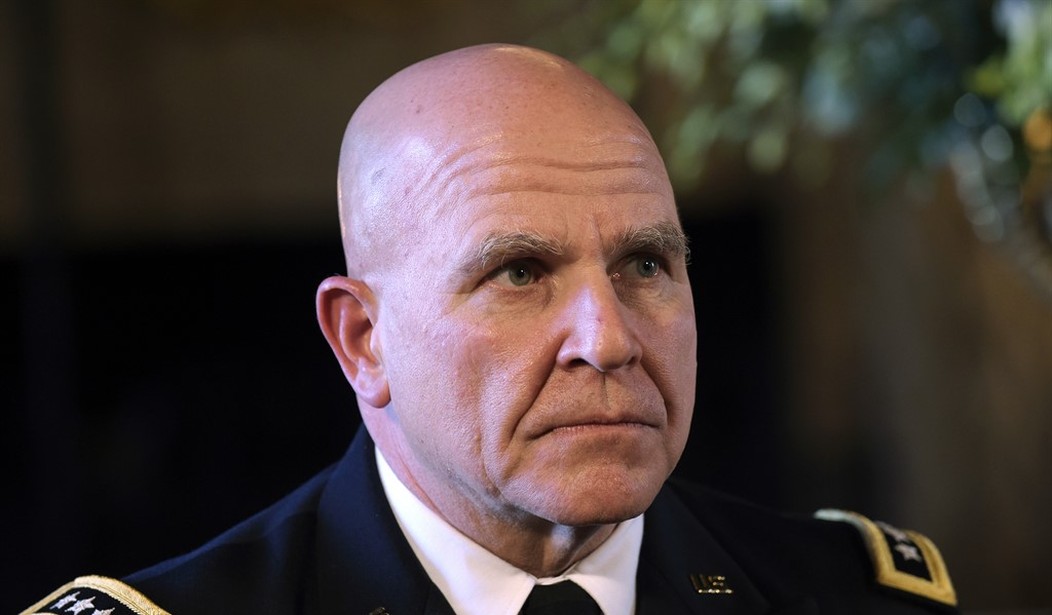Second look at Mike Flynn?
Fortunately, all of the other major military players involved seem to think this is a bad idea.
Senior White House and administration officials tell me Trump’s national security adviser, General H.R. McMaster, has been quietly pressing his colleagues to question the underlying assumptions of a draft war plan against the Islamic State that would maintain only a light U.S. ground troop presence in Syria. McMaster’s critics inside the administration say he wants to send tens of thousands of ground troops to the Euphrates River Valley. His supporters insist he is only trying to facilitate a better interagency process to develop Trump’s new strategy to defeat the self-described caliphate that controls territory in Iraq and Syria…
McMaster himself has found resistance to a more robust ground troop presence in Syria. In two meetings since the end of February of Trump’s national security cabinet, known as the principals’ committee, Trump’s top advisers have failed to reach consensus on the Islamic State strategy. The White House and administration officials say Secretary of Defense James Mattis, Chairman of the Joint Chiefs of Staff Joseph Dunford and General Joseph Votel, who is in charge of U.S. Central Command, oppose sending more conventional forces into Syria. Meanwhile, White House senior strategist Stephen Bannon has derided McMaster to his colleagues as trying to start a new Iraq War, according to these sources.
Are we sure this is a fair characterization of McMaster’s views? There’s a certain beleaguered populist Trump advisor who recently lost a power struggle with McMaster who might be looking to pay him back by distorting his plans for Syria. Flynn, a favorite of Trump’s base, opposed ground troops in Syria; what better way to further diminish his successor in their eyes than by falsely claiming he’s ready to launch Iraq War III? On the other hand, Eli Lake has two sources who say that one plan kicking around right now would involve sending up to … 50,000 troops. He also notes that Gen. Jack Keane, a McMaster ally, agrees that some sort of American troop presence on the ground is necessary to take care of ISIS — not quite “tens of thousands” (at least, not yet) but 10,000. Quote: “Handwringing about U.S. ground troops in Syria was a fetish of the Obama administration. Time to look honestly at a winning military strategy.” What could go wrong?
The problem according to Keane (and McMaster?) is that while the Kurds are willing and able to wrest Raqqa back from ISIS, the local Sunni Arabs won’t tolerate Kurdish occupation of their lands. Turkey’s not a fan of the idea either, forever fearful that the more aggressive the Kurds get across the border in Syria, the more aggressive their own domestic Kurdish population will get. The Keane plan is to deploy American troops to the Euphrates River Valley, set up a base of operations, then advance against ISIS along with troops from friendly Sunni countries in the region — Jordan, Saudi Arabia, etc. That force would take Raqqa and then, presumably, the foreign Sunnis would occupy the city as a peacekeepers. Question one: What sort of American casualties are we imagining in street-by-street fighting in ISIS’s capital? Question two: Wouldn’t an American intervention actually be a shot in the arm recruiting-wise for ISIS at a moment when they’re losing their grip regionally? Question three: What makes us confident that Syrian Arabs will tolerate, say, a Jordanian occupation much better than they’d tolerate a Kurdish one? Question four: How soon would Trump want to pull the plug if things go sideways and his job approval drops to 30 percent?
I’m interested to see some polling on this now that we’re also dropping bombs on ISIS’s enemy in Damascus. Surveys over the past 18 months on sending U.S. troops into battle against ISIS have showed mixed support, with some indicating a slight majority in favor and others below 50 percent, but a lot has changed since then. Namely, Republican support for the mission will probably be much higher with Trump giving the orders now instead of Obama. Unless Democratic support has fallen to a similar extent, which is unlikely, you may have a solid majority in favor of the Keane plan. Plus, although in theory it seems strange to follow up an attack on Assad with a much more comprehensive attack on the other side, superhawks like McCain and Rubio have been insisting lately that you have to crush the latter before you can oust the former. Defeating ISIS is a necessary precondition to defeating Assad. That is, rising Republican bellicosity towards Assad may lead to rising bellicosity against ISIS too, whether due to a considered McCain/Rubio “they’re connected!” strategic view or a more impulsive “let’s just go kick ass in Syria with Trump” approach. Someone should poll it.
Exit question: If Trump and/or McMaster suspect that Bannon and his allies planted this story with Lake to undermine the new NSA, which seems possible, is that the final straw for Bannon?








Join the conversation as a VIP Member